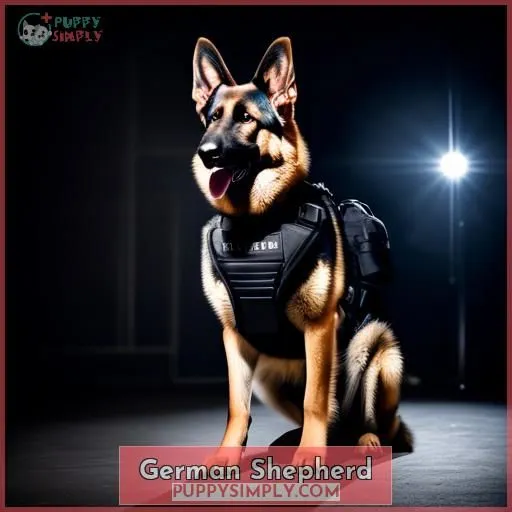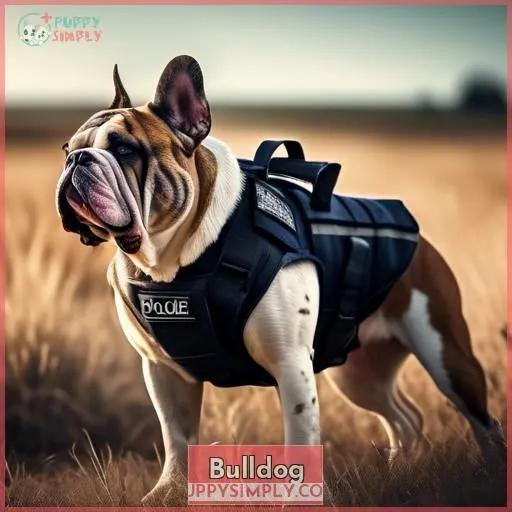This site is supported by our readers. We may earn a commission, at no cost to you, if you purchase through links.

You’re captivated by the elite police dog breeds that serve our communities with unwavering loyalty and bravery.
German Shepherds, Labrador Retrievers, and Belgian Malinois lead the pack, excelling in obedience, agility, and intelligence.
These canine heroes track suspects, sniff out contraband, and detect explosives with unparalleled skill.
Their calm demeanor and hardy nature make them invaluable assets in law enforcement.
While health concerns like hip dysplasia require vigilance, their remarkable temperament shines through.
Embark on a journey to explore the world of these courageous companions as they beckon you to witness their extraordinary abilities.
Table Of Contents
Key Takeaways
- German Shepherds, Labrador Retrievers, Belgian Malinois, Boxers, Bloodhounds, Dutch Shepherds, Doberman Pinschers, Rottweilers, German Shorthaired Pointers, and Bulldogs are the most commonly used breeds for police work.
- These breeds excel in tasks like tracking, sniffing out contraband, detecting explosives, and apprehending suspects.
- Police dogs require appropriate care and attention, including regular exercise, mental stimulation, and socialization.
- When they retire, police dogs often enjoy a well-deserved retirement, often adopted by their handlers’ families as beloved companions.
German Shepherd
Imagine you’re walking down a dimly lit street when a German Shepherd from the K-9 unit appears beside its handler.
This isn’t just any dog; it’s the epitome of police work, embodying obedience commands and agility training with a finesse that’s almost artistic.
Their herding instincts are repurposed into bite work, ensuring that no suspect can outrun justice.
These police dogs are more than just partners; they’re guardians with a bark that commands respect and a loyalty that’s unwavering.
Their presence alone can make you feel like you’ve got your own personal bodyguard, making the night a little less intimidating.
Labrador Retriever
Labrador Retrievers are a popular choice for police work due to their hardiness, intelligence, and friendly nature.
They were originally bred as gun dogs, making them well-suited for tasks like tracking and sniffing out contraband. These dogs are known for their excellent temperament and responsiveness to training.
However, they can be prone to health issues like hip dysplasia and heart disease.
Despite this, they’re still highly sought after for their ability to excel in various law enforcement duties, including search and rescue and service work. Their intelligence and strong work ethic make them versatile partners for officers on the front lines.
Belgian Malinois
The Belgian Malinois is another breed that’s a force to be reckoned with in the realm of law enforcement. These dogs are renowned for their intelligence and dexterity, making them ideal for a diverse range of police duties. Their rapid learning abilities allow them to master tasks from detection to apprehension. However, their exceptional work ethic isn’t their sole distinguishing feature. They’re also fiercely loyal and protective, rendering them invaluable companions for officers on patrol.
As with all police dogs, Belgian Malinois require appropriate care and attention. They demand consistent exercise to maintain their well-being and happiness, and ample mental stimulation to keep their minds sharp. While they possess short, manageable coats, regular brushing is essential to preserve their pristine appearance.
Despite their needs, don’t be discouraged. Belgian Malinois are among the most gratifying police dogs to collaborate with. They’re unwavering in their dedication to their work and possess an inherent desire to satisfy their handlers. Thus, if you seek a partner capable of meeting any challenge, the Belgian Malinois may be the ideal choice.
Boxer
Boxers are a popular choice for police work due to their temperament, trainability, agility, and intelligence. These dogs were originally bred for hunting and have a strong desire to please their handlers, making them well-suited for law enforcement tasks. Boxers are known for their calm demeanor, which makes them easy to work with, even for new K9 handlers. They can find anything with proper training, from criminals and missing people to illegal substances from a mile away. Boxers are alert, energetic, and intelligent dogs that love to stay busy.
Boxers are obedient and versatile, which allows them to be utilized in many areas of police work. They’re particularly effective in protecting law enforcement officers in the line of duty. Boxers are also used for detection work, such as detecting drugs and explosives, and in search and rescue missions. They’re highly responsive to commands and don’t have problems being called off a bite when asked. These traits and physical capabilities make the Boxer an excellent dog breed for law enforcement.
Boxers are medium to large, short-haired dogs with a smooth and tight-fitting coat. They’ve a square muzzle, strong jaws, and a powerful bite, which is ideal for holding onto large prey. Boxers are brachycephalic, meaning they’ve broad, short skulls, and are known for their distinctive head shape. They’re lively, strong, loyal to their owner and family, but distrustful of strangers. Boxers are obedient, friendly at play, but with a guarding instinct. They’re equable, biddable, fearless, and self-assured.
Boxers are popular assistance dogs and are often used in dog sports, such as agility and obedience trials. They’re also used as cadaver dogs to locate human remains. Boxers are generally patient with children and are a popular choice for families. They require adequate exercise to prevent boredom-associated behaviors and respond better to positive reinforcement training techniques. With proper socialization, Boxers are good with smaller dogs and puppies, but difficulties with larger adult dogs may occur.
Bloodhound
The Bloodhound is a formidable and imposing police dog breed, renowned for its exceptional olfactory capabilities. These canines can pursue scents for extended periods, rendering them indispensable in the pursuit of missing individuals or absconding malefactors. Their potent sense of smell extends beyond tracking, enabling them to detect illicit substances, correlate forensic evidence, and even discern explosives.
Unlike the Labrador Retriever or German Short-haired Pointer, which are commonly deployed for detection tasks in public settings, the Bloodhound specializes exclusively in tracking. Their robust and powerful physique, paired with their unwavering focus, transforms them into redoubtable canine enforcers on the front lines.
These canines aren’t merely tracking machines but also possess a composed and tranquil disposition, even in the face of adversity. Their unwavering loyalty and intelligence render them ideal companions for police officers, ever-ready to assist and safeguard.
Dutch Shepherd
Just like the Bloodhound’s nose knows no limits, the Dutch Shepherd’s brilliance gleams in the field.
Envision a dog with the vigilance of a nocturnal guardian and the astuteness of a chess virtuoso. That’s your Dutch Shepherd.
Their traits aren’t merely impressive; they’re the benchmark for obedience and work ethic.
Imagine a quadrupedal officer that can master tricks swifter than you can utter fetch and is perpetually prepared to spring into action.
Their vigilance and intelligence make them the unacknowledged heroes in the canine legion, standing side by side with the likes of the Bouvier des Flandres and the American Pit Bull Terrier, yet distinctive in their own right.
Doberman Pinscher
Meet the Doberman Pinscher, a breed that’s as impressive as its name suggests. Originating in Germany in the late 1800s, the Doberman Pinscher was bred to be a versatile guard dog, combining strength, agility, and intelligence.
Here are five reasons why the Doberman Pinscher is a top choice for police work:
- Intelligence and Trainability: Dobermans are known for their high intelligence and quick learning abilities. They excel in obedience training and can be taught complex tasks.
- Protective Instincts: As a guard dog, the Doberman Pinscher is naturally protective and will act swiftly to defend its family or handler.
- Energy and Endurance: These dogs are high-energy animals that require regular exercise and mental stimulation. They can handle long hours on the job.
- Socialization: Dobermans need extensive socialization to prevent aggression in relation to strangers. Proper socialization helps them distinguish between good guys and potential threats.
- Health and Lifespan: Despite being a large breed, Dobermans are generally healthy with a lifespan of 10-13 years.
Rottweiler
Rottweilers are a formidable breed, renowned for their vigor, fidelity, and guardianship.
They’re frequently employed in law enforcement owing to their amenability and trainability.
Nonetheless, their temperament may vary considerably.
Some lineages are cultivated for strenuous occupational duties, and others for companionship.
Training a Rottweiler demands patience, consistency, and a confident handler who can assert dominance.
Socialization is essential to prevent aggression directed at other animals and people.
Despite their reputation, Rottweilers can become exceptional family companions when properly raised and trained.
German Short-Haired Pointer
The German Short-Haired Pointer may not be the initial breed that comes to mind when you think of police dogs, yet they possess exceptional qualities.
These canines have innate hunting abilities that make them adept at pursuing suspects and locating concealed objects. Their multi-faceted capabilities make them ideal for field operations, ranging from locating missing individuals to detecting explosives.
However, do not be misled by their professional prowess – they also excel as cherished family companions. Their trainability is of the highest order, and they exhibit a keen desire to learn and please their handlers.
If you seek a canine that can navigate the complexities of police work while simultaneously being a steadfast and affectionate family member, the German Short-Haired Pointer could be the optimal choice.
Bulldog
Bulldogs aren’t only renowned for their striking appearance and leisurely disposition; they’re also adored for their amiable, gentle, and playful nature. This breed is often misjudged, as their imposing physical attributes can be misleading. In actuality, bulldogs are remarkably affectionate and protective, making them exceptional family companions.
Here are three essential facts about bulldogs:
- Temperament: Bulldogs are friendly, jovial, and protective. They’re known for their relaxed demeanor and loving nature. However, early socialization is indispensable to preclude them from becoming territorial and uncontrollable around other dogs and animals.
- Health Issues: Bulldogs are susceptible to various health concerns due to selective breeding. They may experience respiratory difficulties, dermatological allergies, and musculoskeletal or respiratory issues. Regular veterinary examinations and appropriate care are vital to safeguard their well-being.
- Training Techniques: Bulldogs are intelligent dogs that can learn swiftly with positive reinforcement. Training should be patient, consistent, and customized to their unique personality traits. Techniques such as agility training, tricks, and advanced training methods can help enhance the connection between the bulldog and its owner.
Despite their health challenges and training requirements, bulldogs are cherished for their companionship and loyalty. With proper care and training, they can become exceptional family pets.
Frequently Asked Questions (FAQs)
How do police dogs retire and what follows?
When it’s time for your furry crime-fighter to hang up the harness, they’ll enjoy a well-deserved retirement, often adopted by their handler’s family as beloved companions.
Can police dogs distinguish between friendly and hostile intentions?
Of course! These highly trained dogs can sense body language and pheromones, allowing them to instantly distinguish friend from foe. Their ability to read humans is essential for safely apprehending suspects without harming bystanders.
What is the average cost to train a police dog?
On average, the ball park figure to train a dog for police work is around $15,000 to $25,000 per pup from day one. But like buying a good car, you get what you pay for – elite training bears elite results.
How are police dogs cared for during off-duty hours?
When the shift ends, these heroic canines deserve the royal treatment! They’re pampered with cozy beds, plenty of playtime, and all the treats their big hearts desire. After all, keeping our communities safe is ruff work – they’ve earned it!
Are there any breeds newly considered for police work?
Certainly, you may be astonished to learn that the Cane Corso is being evaluated for police service. This robust Italian Mastiff breed exhibits self-assurance, an ardent desire to satisfy, and a formidable protective instinct – rendering it an intriguing prospect for law enforcement organizations.
Conclusion
Witnessing these courageous police dog breeds in action evokes admiration and gratitude. Their loyalty, obedience, and unwavering dedication safeguard communities. Embrace the opportunity to learn more about these remarkable canine heroes, whose intelligence and agility make them indispensable assets in law enforcement operations.
















